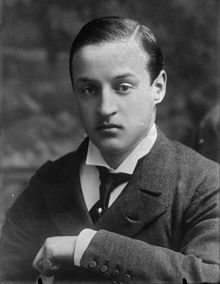Charles Spencer-Churchill, 9th Duke of Marlborough
Charles Richard John Spencer-Churchill, 9th Duke of Marlborough (born November 13, 1871 , † June 30, 1934 ) was a British peer and politician. In reference to his courtesy title Earl of Sunderland , he was also called "Sunny Marlborough" by his contemporaries.
Live and act
He was the only legitimate son of George Spencer-Churchill, 8th Duke of Marlborough , from his first marriage to Lady Albertha Frances Anne Hamilton. As his father's apparent marriage , he carried the courtesy title of Earl of Sunderland from 1871 to 1883 and the courtesy title of Marquess of Blandford from 1883 to 1892 . He attended Winchester College we studied at Trinity College of Cambridge University . When his father died in 1892, he inherited his title of nobility as Duke of Marlborough and thereby became a member of the House of Lords . In 1894 he was accepted into the Privy Council and in 1902 as a Knight Companion in the Order of the Garter. At the coronation of King Edward VII in 1902, he served as Lord High Steward .
In the Salisbury government , he served as Paymaster General from 1899 to 1902 . As a captain in the staff of the Imperial Yeomanry , he took part in the Second Boer War under General Lord Roberts in 1900 and was mentioned in despatches . From 1902 to 1905 he served as Undersecretary of State in the Colonial Ministry in the government of Arthur Balfour . From 1907 to 1908 he was Mayor of Woodstock in Oxfordshire . His cousin Winston Churchill , whose early election campaigns he helped to finance, tried to install him as Governor General of Australia , but the attempts failed in 1904 due to resistance from Joseph Chamberlain . Winston Churchill got him the post of Lord Lieutenant of Oxfordshire in 1915 , which he held until his death in 1934. In the First World War he served as Lieutenant-Colonel in the General Staff from 1914 and was Joint Parliamentary Secretary at the Board of Agriculture and Fisheries from 1917 to 1918 . From 1908 he was Colonel of Honor of 3rd (Special Reserve) Battalion of the Oxfordshire and Buckinghamshire Light Infantry and from 1918 to 1920 he was Colonel of Honor and Commander of the Oxfordshire Volunteer Regiment of the Volunteer Training Corps .
In the interwar period, the Duke distinguished himself primarily through his divorces, about which the British newspapers reported extensively, as well as through his paranoid and anti-Semitic political views, which pushed him even further politically. Socially, Spencer-Churchill was also in an extremely bad reputation - especially because of his second marriage, which was considered improper: Both Edward VII and George V refused to receive the Duke at court. Spencer-Churchill was financially unsuccessful in managing the family's wealth. At the time of his death, he was bankrupt and about to sell the family archives to Yale University .
Marriage and offspring
On November 6, 1895, his first marriage in New York was the American Consuelo Vanderbilt , a member of the prominent Vanderbilt family , who had made great fortune by building railways. The marriage had two sons:
- John Albert Edward William Spencer-Churchill, 10th Duke of Marlborough (1897–1972);
- Lord Ivor Charles Spencer-Churchill (1898-1956).
The marriage ended in divorce in 1921. That same year, on June 25, 1921, he married the American Gladys Marie Deacon in Paris . The marriage remained childless, was considered unhappy and was annulled in 1931.
Spencer-Churchill used his first wife's dowry to renovate his family residence , Blenheim Palace , and to supplement the inventory, which was partially sold in the 19th century. In addition, he had the landscape gardener Achille Duchene create the palace's famous water gardens.
Web links
- Charles Richard John Spencer-Churchill, 9th Duke of Marlborough on thepeerage.com
- Mr Charles Spencer-Churchill at Hansard (English)
- Marlborough, Duke of (E, 1702) at Cracroft's Peerage
| predecessor | Office | successor |
|---|---|---|
| George Spencer-Churchill |
Duke of Marlborough 1892-1934 |
John Spencer-Churchill |
| personal data | |
|---|---|
| SURNAME | Spencer-Churchill, Charles, 9th Duke of Marlborough |
| ALTERNATIVE NAMES | Spencer-Churchill, Charles Richard John, 9th Duke of Marlborough; Spencer-Churchill, Charles, Earl of Sunderland; Spencer-Churchill, Charles, |
| BRIEF DESCRIPTION | British peer and politician |
| DATE OF BIRTH | November 13, 1871 |
| DATE OF DEATH | June 30, 1934 |
| Place of death | Blenheim Palace |


